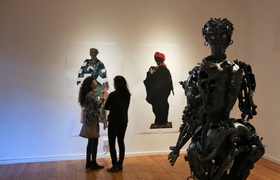UCT-led project amplifies mothers’ voices to effect social change
21 December 2023 | Story Thandile Xesi. Photos Nasief Manie. Read time 6 min.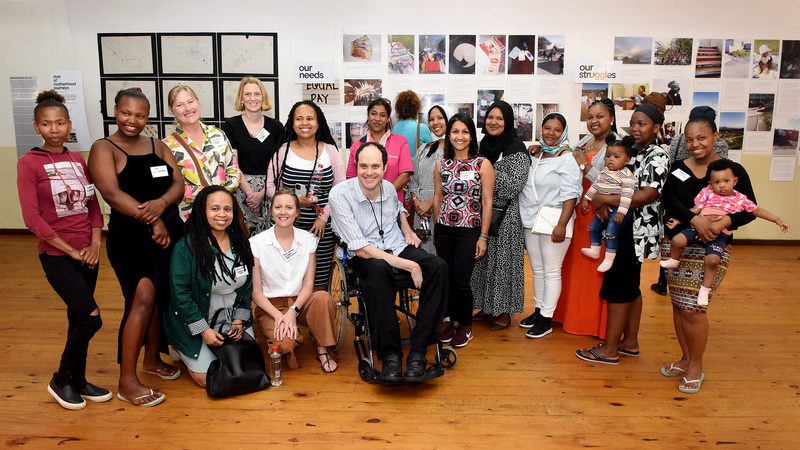
At the intersection of art, activism and academia, the University of Cape Town’s (UCT) Photovoice project is making waves for all the right reasons, including the innovative way that prioritises the voices of South African mothers.
The project stemmed from UCT’s Vision 2030 Grand Challenges Programmes and Pilot Projects, and aims to generate new knowledge relevant to, and for the benefit of, Cape Town and the rest of the country. It sprouted the Motherload Photovoice Exhibition – an initiative committed to addressing complex social issues through transdisciplinary collaboration between academics and non-academic stakeholders.
The exhibition, premiered in November, has created a powerful platform for mothers to advocate for change and challenge policy makers to address systemic issues that impact women and their families. The mothers’ visual images and facilitated discussions revealed the nuanced and often overlooked care burden that emerges from their precarious lived experiences, and from absence of support from their children’s fathers or male partners. Through their art, insights, and calls for action, each participant is paving the way for a more inclusive society, where the voices and experiences of women are placed at the forefront of decision-making processes.
Decolonial research approach
Initiated and led by UCT’s Professor Ameeta Jaga from the School of Management Studies, the project used photovoice as a decolonial research approach to amplify the voices of women in Cape Town, the rest of South Africa and elsewhere in the world.
“The project uses a decolonial and feminist lens to foreground women’s voices and lived realities that have often been misunderstood by policy experts,” said Professor Jaga.
Also representing UCT, Professor Suki Goodman, the dean of the Faculty of Commerce, emphasised the need to centre the voices and experiences of women in policy making and how this will help shed light on their struggles, strengths, and needs, as well as the immense mental load of mothering without resources, visibility and support.
“The exhibition unequivocally places mothers in the centre of the research endeavour; it is their expert knowledge regarding their lived realities that draws us in, shedding light on the persistent under-recognition of women’s unpaid care work in South Africa, despite existing gender-equity legislation,” said Professor Goodman.
Mothers as agents for change
Twelve mothers joined the project as co-researchers and shared their artistic creations and ideas on some of the complex realities of motherhood and caregiving.
Participant Nadine Nagan-Alexander said she has gained valuable insight into the shared experiences and challenges of mothers. She praised the project for its uniqueness and for cultivating a sense of community and empathy among the diverse group of participants.
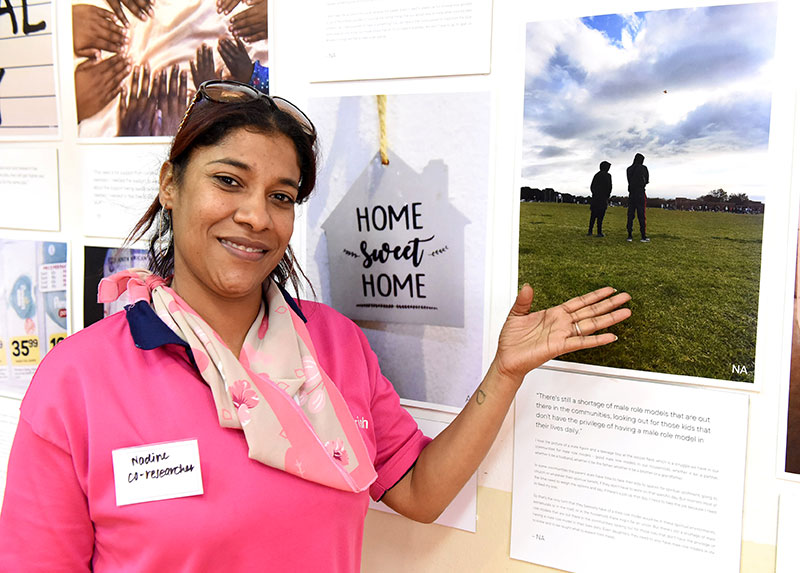
“Even though we come from different backgrounds, our issues and experiences are similar, and they all boil down to the basic interests of our children,” said Nagan-Alexander.
Her artistic creation is titled “Shortage of good role models in our communities” and foregrounded the imbalanced dynamic where women bear the brunt of both domestic and professional responsibilities, often with little support or recognition.
“The dearth of positive male role models in our communities has resulted in an unsustainable overburdening of women,” she said.
Nagan-Alexander advocates for more equitable and inclusive culture in the workplace. She said women must feel valued, supported, and comfortable to bring their whole selves, including their roles as mothers, to their respective workplaces. She said she envisions workspaces that embrace motherhood and offer accommodations like child-friendly facilities, allowing women to thrive professionally without sacrificing their parental responsibilities.
“I strongly believe in promoting gender equality in the workplace, and one way to achieve that is to provide better support for working mothers. Crèches or designated spaces where mothers can breastfeed their children would make workplaces more inclusive and family friendly. This would enable mothers to balance their work and family responsibilities more easily and feel more valued and supported.”
Bolster employment
Co-researcher Almaaz Abrahams agreed. She said the project helped to demonstrate the interconnected struggles mothers experience on a day-to-day basis.
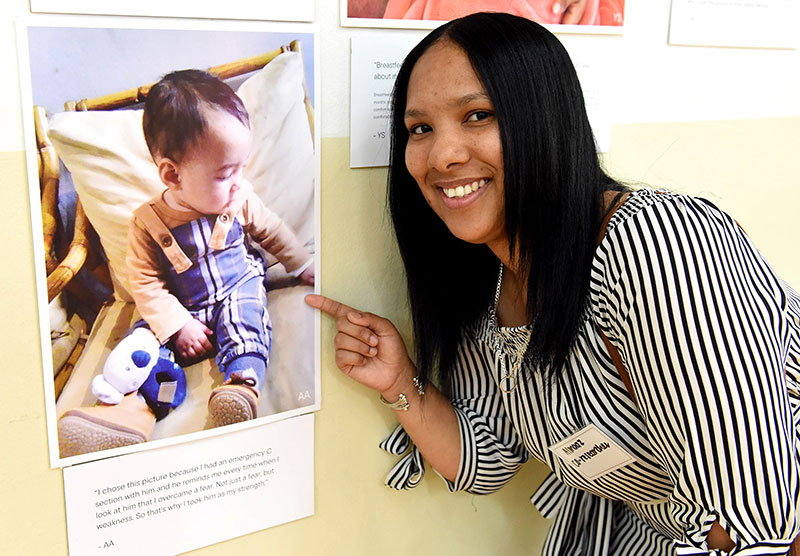
“I am thankful [to be a part] of this project. I [didn’t know] that there were mothers out there who are going through the same struggles as me,” Abrahams said.
Her artwork depicted her child, born via c-section, as a beacon of hope and resilience.
“Every time I look at my child, I am reminded of the courage and strength I possess within,” she said.
In addition, Abrahams called on government to take action and improve job creation and financial stability for South African mothers and all other citizens.
“Government initiatives to bolster employment and financial security are crucial to improving the overall quality of life for individuals. Job creation and financial stability go hand in hand, and policies that promote these factors have the potential to make a real difference in people’s lives.”
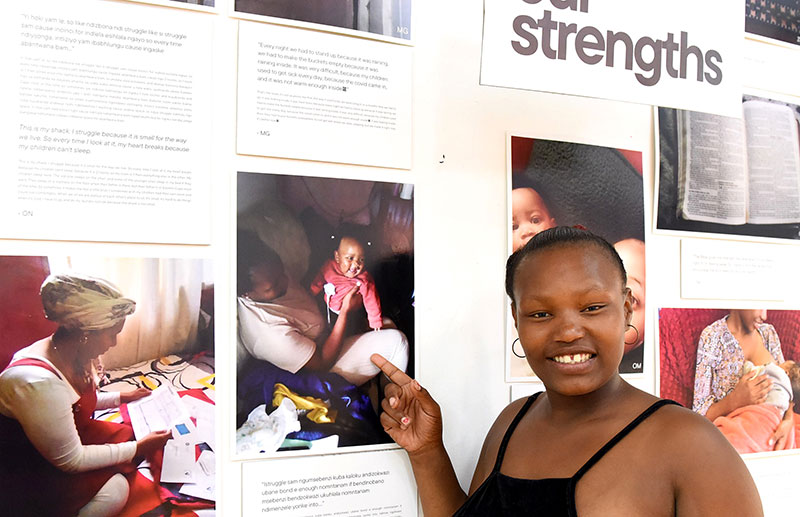
The third co-researcher, Masibulele Makhalisa, also emphasised the critical need to improve employment levels in South Africa to support mothers. She said securing a job would be life-changing and will provide mothers with financial security, as well as a sense of fulfilment and purpose.
Her art piece depicted the transformative impact that employment can have on one’s life.
“In today’s challenging economic landscape, the stress of raising a child is amplified by the burden of financial instability. Obtaining a reliable job can be a game-changer [in] enabling parents to provide for their children. [It will] reduce anxiety, and foster a greater sense of independence and self-worth,” Makhalisa said.
Bridging the gap
Tristan Gorgens, who represented the Policy, Strategy and Research Unit, based in Western Cape Premier Alan Winde’s office, highlighted the importance of partnerships between the government, academia and civil society organisations (CSOs) to support families. He emphasised the crucial role of the family strengthening programs (FSPs) to empower parents and caregivers to provide better care for their families.
“We have FSPs in the Western Cape Government where we work with CSOs. These programmes assist parents and other primary caregivers so that they can better take care of their families.”
In support of the exhibition and its significance, Gorgens echoed the urgent need for policy makers to elevate the voices of mothers in decision-making processes.
“To effect real change, the perspectives and concerns of mothers must take centre stage in the policy-making process. By amplifying their voices and advocating for their needs, we can ensure that politicians and officials make decisions that truly benefit women and children,” he said.
 This work is licensed under a Creative Commons Attribution-NoDerivatives 4.0 International License.
This work is licensed under a Creative Commons Attribution-NoDerivatives 4.0 International License.
Please view the republishing articles page for more information.










